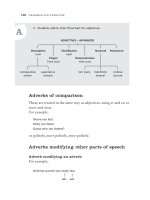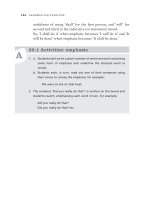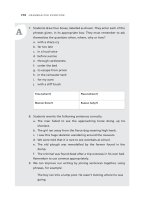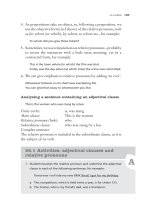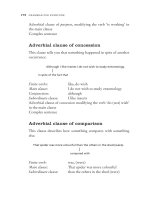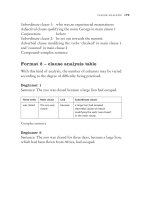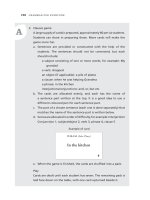Tài liệu Grammar for everyone part 31 ppt
Bạn đang xem bản rút gọn của tài liệu. Xem và tải ngay bản đầy đủ của tài liệu tại đây (82.61 KB, 7 trang )
200
Bibliography
General
Baugh, Albert, C. & Cable, Thomas, A History of the English Language,
Routledge & Kegan Paul, London, 1987.
Biddulph, Steve, Raising Boys: Why Boys Are Different and How to Help
Them Become Happy and Well Balanced Men, Finch Publishing,
Sydney, 1997.
Clairbome, Robert, The Life and Times of the English Language,
Bloomsbury, London, 1990.
Crystal, David & Crystal, Hilary, Words on Words: Quotations about
Language and Languages, Penguin Books, Middlesex UK, 2000.
Dykes, Barbara, Down to Earth Grammar, Series 1–3, Nutshell Products,
Kalbar, Qld, 2002/3.
Dykes, Barbara, Grammar Made Easy, Hale & Iremonger, Sydney, 1992.
Dykes, Barbara, ‘Thinking of boys’, Sharing Best Practice in Australian
Schools, Launceston, Tasmania, 2001.
Dykes, Barbara, Swallow, Gavin & Ward, Sarah, Spelling Programme for
All—Literacy Resources, Nutshell Products, Kalbar Qld, from 2000.
Hackett T.P., Essential Grammar and English Usage: What Everyone
Needs to Know, self-publication, 1977.
House of Representatives Standing Committee on Education & Training,
Boys: Getting It Right, report on the inquiry into the education of
boys, Parliament of the Commonwealth of Australia, Canberra, 2002.
Hudson, Nicholas, Modern Australian Usage, Oxford University Press,
Melbourne, 1993.
Macmillan, Bonnie, Why School Children Can’t Read, IEA (Institute of
Economic Affairs), London, 1997.
McArthur, Tom (ed.), The Oxford Companion to the English Language,
BCA by arrangement with Oxford University Press, London, 1992.
Nesfield, J.C., Outline of English Grammar, Macmillan & Co, London,
1929.
Sayers, Dorothy, ‘The Lost Tools of Learning’, Oxford University paper,
1947.
Swallow, Gavin, Word Building, 4th edn, Nutshell Products, Kalbar, Qld,
2007.
Truss, Lynne, Eats, Shoots and Leaves: The Zero Tolerance Approach to
Punctuation, Profile Books, London, 2003.
Wise, Jessie & Wise Bauer, Susan, The Well-Trained Mind: A Guide to
Classical Education at Home, WW Norton & Company, New York &
London, 1999.
Dictionaries and encyclopedias
Collins Concise Dictionary, 5th Australian edn, Harper Collins, Glasgow,
2001.
The Concise Oxford Dictionary, 4th edn, Clarendon Press, Oxford, 1954.
Crystal, David, The Cambridge Encyclopaedia of the English Language,
Cambridge University Press, Cambridge, 1995.
Dictionary of Grammar, Redwood Editions, Victoria, Australia, 1998.
Harrap, George G., Harrap’s Concise French and English Dictionary,
George G Harrap & Company, London, 1956.
Reader’s Digest Universal Dictionary, Reader’s Digest Association, Far
East, Philippines.
Thomas, Millicent Inglis, Cassell’s Compact Latin Dictionary, Cassell &
Company, Hants, UK, 1957.
Webster’s New Twentieth Century Dictionary, World Publishing
Company, New York, 1952.
201
b i b l i o G r A p h Y
202
Glossary
Definitions are also given for each grammar term under its
respective section category. Below are short definitions of terms
as used in this book.
abbreviation: that which cannot be seen or touched, i.e. not concrete
accusative:
of case, identifying the direct object
active:
of voice, describes a verb in which the subject is responsible for
the action
adjectival:
concerning, or having the function of an adjective
adjective:
a word that describes (qualifies) a noun or pronoun
adverb:
a word that gives information about (modifies) a verb
adverbial:
concerning or having the function of an adverb
analysis:
the division of a sentence into its constituents
apostrophe:
a punctuation mark indicating possession, or omission
(contraction)
article:
the words a, an, the, indicating any one of something, or a
specific one
auxiliary:
of a verb, a helper, usually accompanying an infinite verb, in
order to form a finite tense
brackets: punctuation marks, showing parenthesis, and enclosing infor-
mation additional to the structure of a sentence
capital:
of letters, upper case
case:
term denoting the function of a noun or pronoun in a sentence
clause:
a group of words, including a finite verb, forming all or part of
a sentence
collective:
of a noun, denoting a word in the singular, given to a group
of something
colon: a punctuation mark indicating additional information to follow
comma:
a punctuation mark which serves to separate part of a sentence,
and indicating a pause
common:
category of noun applied to things which are common to a
group, i.e. not a particular one
comparison:
that which compares
complement:
a word or group of words completing the sense of any
form of the verb ‘to be’, and being, or referring to, the same person
or thing that is the subject of the verb
complex:
of a sentence which includes one main clause and one or more
subordinate clauses
compound:
of a word, two words put together to form a third word; of
a sentence, one consisting of two or more main clauses
compound-complex:
of a sentence, one consisting of more than one
main clause, plus one or more subordinate clauses
concession:
of a phrase or clause, that which concedes or admits a
possible happening
condition:
of a phrase or clause, that which depends for its fulfilment on
something else happening
conjunction:
a word that links two things, or introduces a subordinate,
adverbial or noun clause
continuous:
of tense, expressing continuous action
dashes:
punctuation marks in the form of short lines, that separate a
piece of information from the remaining part of the sentence –
usually less formal than brackets
dative:
of case, the part of a sentence forming the indirect object indicated
by ‘to’ or ‘for’ someone or something
definite:
of article, the
degree:
a level of comparison applied to gradable adjectives or adverbs
demonstrative:
of adjectives or pronouns, indicating particular items,
e.g. this …
determinant: (or determiners) modern term generally referring to
articles and various kinds of adjectives
direct:
of speech, the exact words spoken, marked with inverted
commas
203
G l o s s A rY
direct object: that part of the sentence which is acted upon by the verb
distributive:
of pronouns, referring to an individual member of a class
or group, e.g. each
emphasis:
of speech, the stress given to a particular part of a sentence
for additional meaning
exclamation mark:
a punctuation mark, following a word or phrase
that shows strong feeling such as surprise or horror
feminine:
of gender, pertaining to female
finite:
of a verb, a form that is complete in tense and has a subject
full-stop:
(or period) a punctuation mark at the end of a statement or
command
future:
of a verb, the tense relating to something yet to happen
gender:
the distinction between masculine, feminine or neuter
genitive:
of mood, the form of a sentence which denotes possession
gerund:
a participle, having the function of a noun
idiom:
a phrase of which the meaning cannot be deduced from the words
that comprise it
imperative:
of mood, the verb form of a sentence that constitutes a
command
indefinite:
of article, a or an; of pronouns, those which are non-specific,
e.g. someone
indicative:
of mood, the verb form of a statement
indirect:
of object, that person or thing indirectly affected by the action
of the verb; of speech, that which is reported to have been spoken,
by someone addressing a third party
infinitive:
the form of a verb that shows no tense and has no subject,
often preceded by ‘to’ as in ‘to be’
inflexion:
that action by which various spelling forms such as affixes
alter the meaning of a word, as in break, breakable
interjection:
an exclamation, one word or several denoting shock or
other strong emotion
interrogative:
of a pronoun, adjective or adverb, introducing a question;
of a sentence, a question
intonation:
of speech, the tone which helps to convey meaning
intransitive:
of a verb, one that does not have an object
204
G l o s s A rY

